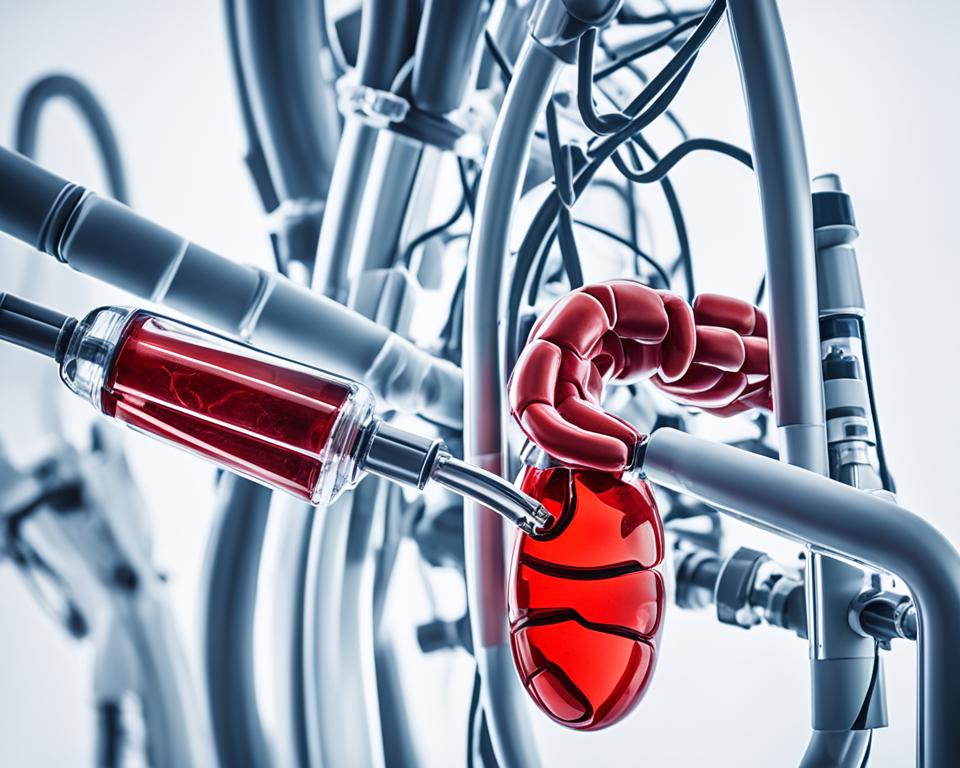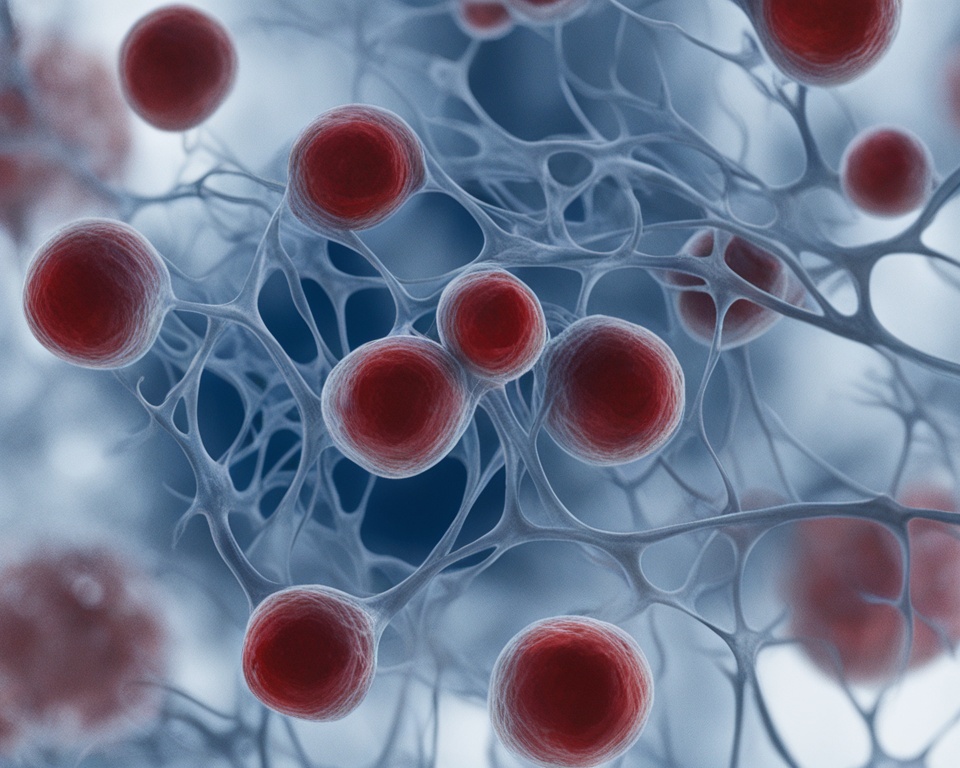
Chronic kidney disease (CKD) is a condition that gets worse over time. It can greatly affect a person’s health and quality of life. Anemia is a common issue with CKD, marked by fewer red blood cells or less hemoglobin. This piece will look into how CKD and anemia are linked, covering their causes, signs, diagnosis, and treatment.
Read interesting things at : web-quanto
Key Takeaways
- Chronic kidney disease (CKD) is a leading cause of anemia, a condition characterized by reduced red blood cells or hemoglobin.
- Anemia in CKD is primarily caused by erythropoietin deficiency and iron deficiency, which can lead to fatigue, weakness, and shortness of breath.
- Early diagnosis and treatment of anemia in CKD patients are crucial to managing the condition and improving quality of life.
- Erythropoiesis-stimulating agents (ESAs) and iron supplements are common treatment options for anemia in CKD, but nutritional considerations and lifestyle changes are also important.
- Preventing and managing anemia in CKD patients can help reduce the risk of complications and improve overall health outcomes.
What is Chronic Kidney Disease?
Chronic kidney disease (CKD) is a condition where the kidneys slowly lose their ability to filter waste and fluids from the blood. This can lead to harmful substances building up in the body. If not treated, it can cause kidney failure.
Stages of Chronic Kidney Disease
CKD has five stages, each showing a different level of kidney function. The stages are based on the glomerular filtration rate (GFR). This measures how much blood the kidneys can filter each minute.
- Stage 1: Slightly decreased kidney function with a GFR of 90 or above
- Stage 2: Mild decrease in kidney function with a GFR between 60 and 89
- Stage 3: Moderate decrease in kidney function with a GFR between 30 and 59
- Stage 4: Severe decrease in kidney function with a GFR between 15 and 29
- Stage 5: Kidney failure with a GFR less than 15, often requiring dialysis or a kidney transplant
Risk Factors and Causes
The main causes and risk factors for chronic kidney disease are:
- Diabetes: High blood sugar can damage the kidneys’ small blood vessels, leading to CKD
- High blood pressure: Uncontrolled high blood pressure can harm the kidneys over time
- Glomerulonephritis: Inflammation of the kidneys’ tiny filters can reduce their function
- Polycystic kidney disease: A genetic disorder causing many cysts in the kidneys, which can damage them
- Kidney stones: Hard deposits in the kidneys can block urine flow and harm the tissue
Identifying and managing these risk factors early can slow down CKD progression and prevent kidney failure.
Anemia and Chronic Kidney Disease
Chronic kidney disease (CKD) is a condition that gets worse over time. It often leads to anemia, a decrease in red blood cells or hemoglobin levels. This is a big concern for people with CKD.
CKD and anemia are closely linked. When kidneys get damaged, they make less erythropoietin (EPO). EPO helps make red blood cells. So, not enough EPO means fewer red blood cells, causing anemia.
People with CKD might also lack iron, making anemia worse. Kidney disease can make it hard for the body to use iron. Iron is key for making hemoglobin, which carries oxygen in red blood cells.
| Condition | Impact on Anemia |
|---|---|
| Chronic Kidney Disease | Reduced erythropoietin production and iron deficiency can lead to the development of anemia. |
| Renal Anemia | Anemia that is specifically caused by chronic kidney disease, often due to decreased erythropoietin and iron levels. |
It’s important to understand how CKD and anemia are connected. This helps in treating both conditions early and effectively. Healthcare professionals can then create plans to help manage anemia in people with chronic kidney disease.
ckd and anemia
Chronic kidney disease (CKD) and anemia often go together. The kidneys’ decline affects how the body makes and controls important parts for red blood cells. Key factors causing anemia in CKD patients are erythropoietin deficiency and iron deficiency.
Erythropoietin Deficiency
Erythropoietin is a hormone made by the kidneys. It helps the bone marrow make red blood cells. But as CKD gets worse, making erythropoietin drops. This means fewer red blood cells and anemia.
Iron Deficiency
Another big cause of anemia in CKD patients is iron deficiency. The kidneys help manage iron levels. But as they fail, using and getting enough iron becomes harder, making anemia worse.
“Anemia is a common complication of chronic kidney disease, affecting up to 90% of patients as their kidney function declines.”
Fixing the root causes of ckd and anemia, like not enough erythropoietin and iron, is key. It helps manage anemia in CKD patients and boosts their life quality.
Symptoms of Anemia in CKD Patients
Chronic kidney disease (CKD) patients often face symptoms linked to anemia, a common issue. It’s key to know these signs for early treatment and better management of anemia in CKD.
Fatigue and Weakness
Anemia in CKD patients often brings constant tiredness and weakness. With fewer red blood cells and lower hemoglobin, the body can’t carry enough oxygen. This makes even simple tasks hard to do.
Shortness of Breath
Feeling short of breath, or dyspnea, is another issue for CKD patients with anemia. The blood can’t carry enough oxygen, making breathing hard, even when resting or doing light activities. This greatly affects their daily life and happiness.
Spotting these anemia signs in CKD patients is key for early action and better care. By treating the anemia, doctors can ease these tough symptoms. This helps improve life quality for those with chronic kidney disease.
Diagnosing Anemia in CKD
Getting an accurate diagnosis of anemia in patients with chronic kidney disease (CKD) is key. Blood tests are crucial for spotting and checking anemia in those with CKD.
Blood Tests
The main blood tests for finding anemia in CKD patients are:
- Hemoglobin (Hb) – This measures the oxygen-carrying protein in red blood cells. Low levels mean anemia.
- Hematocrit (Hct) – It shows the percentage of red blood cells in the blood. A low Hct means anemia.
- Iron levels – Includes tests for serum ferritin, transferrin saturation, and other iron markers. These help figure out why someone has anemia, like iron lack or other reasons.
Healthcare providers use these blood test results to accurately diagnose anemia in CKD patients. They can then make a treatment plan. Keeping an eye on these tests is key to managing anemia and improving patient care.
“Proper diagnosis of anemia is the first step towards effective management of this common complication of chronic kidney disease.”
Treatment Options for Anemia in CKD
For patients with chronic kidney disease (CKD), managing anemia is key to their health. There are many effective treatments available. Each one targets the main causes of anemia in these patients.
Erythropoiesis-Stimulating Agents (ESAs)
ESAs like epoetin alfa and darbepoetin alfa are main treatments for anemia in CKD. They boost red blood cell production. This helps because the kidneys can’t make enough erythropoietin (EPO) on their own.
Iron Supplements
Iron supplements are also key for treating anemia in CKD patients. Many of these patients lack iron, which worsens anemia. Giving them iron can help make more red blood cells and raise hemoglobin levels.
Choosing between ESAs, iron supplements, or both depends on the patient’s anemia cause and how they react to treatment. It’s important for the healthcare team and patient to work closely together. This ensures the best results.
| Treatment Option | Mechanism of Action | Benefits |
|---|---|---|
| Erythropoiesis-Stimulating Agents (ESAs) | Stimulate red blood cell production | Addresses anemia caused by EPO deficiency in CKD |
| Iron Supplements | Provide supplemental iron to support red blood cell production | Effective for anemia caused by iron deficiency in CKD |
With these targeted treatments, healthcare providers can help CKD patients control their anemia. This improves their quality of life.
Impact of Anemia on Quality of Life
Anemia is a common issue for people with chronic kidney disease (CKD). It can greatly affect their life quality. Symptoms like fatigue, weakness, and shortness of breath make it hard to do daily tasks, exercise, and live an active life.
Studies link anemia in CKD patients to a lower quality of life. People with anemia feel less energetic and have trouble with physical and social activities. They also struggle with their emotional and mental health.
Anemia’s effects go beyond just physical health. It can make it hard to work, enjoy free time, and keep up relationships. It also means more visits to the doctor, more hospital stays, and a bigger load on patients and healthcare providers.
It’s important to spot and treat anemia in CKD patients to better their life quality. Using treatments like erythropoiesis-stimulating agents (ESAs) and iron can ease symptoms. This can help with physical, emotional, and social health.
“Anemia is a big reason why people with chronic kidney disease feel worse. Fixing this issue is key to better health and happiness.”
Healthcare providers can work with CKD patients to create treatment plans that focus on anemia. This can help increase energy, improve physical abilities, and make life better for those with chronic kidney disease and anemia.
Hemodialysis and Anemia Management
For people with chronic kidney disease (CKD) who reach end-stage renal disease, hemodialysis is key. But, managing anemia in these patients is tough.
The dialysis process itself often causes anemia. Blood is filtered through a machine, leading to a loss of red cells and iron. This makes it harder for the kidneys to make erythropoietin, a hormone that helps make red blood cells.
| Factors Affecting Anemia in Hemodialysis Patients | Impact |
|---|---|
| Blood loss during dialysis | Reduced red blood cell counts and hemoglobin levels |
| Impaired erythropoietin production | Decreased stimulation of red blood cell production |
| Iron deficiency | Insufficient iron for red blood cell formation |
Healthcare providers must watch and fix these issues to manage anemia in hemodialysis patients. Erythropoiesis-stimulating agents (ESAs) and iron supplements help increase red blood cell production and keep hemoglobin levels right.
It’s vital to keep anemia under control for hemodialysis patients. Without treatment, anemia can cause fatigue, lower physical ability, and increase the risk of heart problems. By tackling anemia early, healthcare teams can make life better for those on hemodialysis.
Nutritional Considerations for CKD and Anemia
Proper nutrition is key for managing anemia in those with chronic kidney disease (CKD). Eating foods high in iron and taking vitamin supplements helps make more red blood cells. This can fight the anemia linked to CKD.
Iron-Rich Foods
For CKD patients with anemia, eating iron-rich foods is vital. Great sources include red meat, poultry, fish, beans, lentils, and leafy greens. Adding foods high in vitamin C, like oranges, can help your body absorb iron better.
- Red meat
- Poultry
- Fish
- Beans
- Lentils
- Leafy green vegetables
- Citrus fruits
Vitamin Supplements
Vitamin supplements can also help manage anemia in CKD patients. Folic acid and vitamin B12 are crucial for making red blood cells. A healthcare professional can guide you on the right supplements to take.
“Proper nutrition is essential for managing anemia in CKD patients. By focusing on iron-rich foods and strategic vitamin supplementation, we can support the body’s red blood cell production and improve overall health outcomes.”

Preventing Anemia in CKD Patients
Keeping an eye on anemia prevention is key for those with chronic kidney disease (CKD). Starting early and taking action can lower the chance of getting anemia. This is a common issue with CKD. By using specific plans, doctors can help keep the kidneys working well and keep hemoglobin levels healthy.
One important step is to watch and manage the kidneys closely. This means keeping an eye on the glomerular filtration rate (GFR). The GFR shows how well the kidneys filter waste and fluids. Catching any drop in kidney function early lets doctors start treatments to slow down CKD and lower anemia risk.
It’s also vital to look at things that might increase the risk of anemia. This could mean managing health issues like diabetes or high blood pressure. Doctors might suggest changes in diet, supplements, or medicine to fix iron or erythropoietin levels that could cause anemia.
- Regular monitoring of kidney function and GFR
- Proactive management of underlying medical conditions
- Targeted dietary and supplementation strategies
- Timely intervention to address deficiencies
With these detailed anemia prevention steps, doctors can help CKD patients stay healthy. They can also improve their life quality and cut down on anemia problems. Working together with the healthcare team is key to preventing and managing anemia with chronic kidney disease.
Complications of Untreated Anemia in CKD
Chronic kidney disease (CKD) and anemia often go together. If not treated, this can lead to serious health issues. Anemia in CKD patients can greatly affect their health and well-being.
One big worry is the higher risk of heart disease. Anemia makes the heart work too hard to move oxygen-rich blood around. This can cause heart failure, a very serious condition.
Also, not treating anemia can mean more hospital visits. Symptoms like feeling very tired and short of breath make everyday tasks hard. This leads to more trips to the hospital.
Not treating anemia in CKD patients is very dangerous. It can lead to an early death. Studies show that those with anemia are more likely to die young than those who get treatment.
Healthcare experts know how important it is to treat anemia in CKD patients. They stress the need for quick diagnosis and treatment. By treating anemia, doctors can lessen the anemia complications linked to chronic kidney disease. This helps improve health outcomes for patients.
“Treating anemia in CKD patients is crucial to reducing the risk of cardiovascular complications and improving their quality of life.”
Latest Research and Developments
The study of chronic kidney disease (CKD) and anemia is always changing. Researchers are finding new ways to help manage anemia in people with CKD. They aim to make patients’ lives better and improve their health.
Advancements in Anemia Research
Scientists are now looking into why anemia happens in CKD patients. They’re studying genetics, new markers, and how different body systems work together. This knowledge will help create better treatments for each patient.
Emerging Therapies for Anemia in CKD
New treatments are coming along with the old ones, like ESAs and iron supplements. These new treatments aim to tackle anemia in CKD patients in new ways. They include:
- HIF stabilizers, which help the body make more erythropoietin naturally.
- New iron types that work better.
- Therapies that tackle several anemia causes at once.
These new treatments could make managing anemia easier for CKD patients.
Technological Advancements
Technology is also changing how we handle anemia in CKD. For example, remote monitoring and telemedicine let doctors check on patients more often. This helps them adjust treatments quickly.

As research in CKD and anemia goes on, we can expect better treatments. This will make life better for people with this condition.
Conclusion
The link between chronic kidney disease and anemia is complex and important to understand. Patients with CKD need to watch their health closely. Anemia can greatly affect their health and life quality.
By keeping up with the latest in ckd and anemia research, doctors and patients can make good treatment plans. These plans should tackle the root causes of anemia and lessen its effects.
It’s key to correctly diagnose and manage anemia in CKD patients. This can ease symptoms like tiredness, weakness, and shortness of breath. It helps them function better in daily life and feel better overall.
Using erythropoiesis-stimulating agents, iron supplements, and changing diets can help manage anemia. These steps are crucial for the health of people with chronic kidney disease.
The search for new ways to manage anemia in CKD patients is ongoing. It’s vital for doctors and patients to stay updated and active. Understanding the link between ckd and anemia helps us improve the lives of those affected. It leads to better health outcomes for people with chronic kidney disease.






